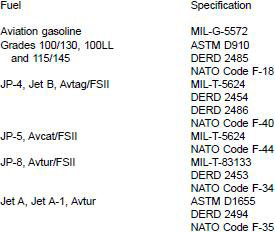1. Scope
1.1 This test method covers the estimation of the net heat of combustion at constant pressure in metric (SI) units, megajoules per kilogram.
1.2 This test method is purely empirical, and it is applicable only to liquid hydrocarbon fuels derived by normal refining processes from conventional crude oil which conform to the requirements of specifications for aviation gasolines or aircraft turbine and jet engine fuels of limited boiling ranges and compositions as described in Note 1.
NOTE 1 - The estimation of the net heat of combustion of a hydrocarbon fuel from its aniline point temperature and density is justifiable only when the fuel belongs to a well-defined class for which a relationship between these quantities has been derived from accurate experimental measurements on representative samples of that class. Even in this class, the possibility that the estimates can be in error by large amounts for individual fuels should be recognized. The JP-8 fuel, although not experimentally tested, has properties similar to JP-5 and Jet A fuels and can be considered in the same class. The classes of fuels used to establish the correlation presented in this test method are represented by the following applications:

1.3 The net heat of combustion can also be estimated by Test Method D1405. Test Method D1405 requires calculation of one of four equations dependent on the fuel type with the precision equivalent to that of this test method.
1.4 The values stated in acceptable metric units are to be regarded as the standard.
1.5 This standard does not purport to address all of the safety concerns, if any, associated with its use. It is the responsibility of the user of this standard to establish appropriate safety and health practices and determine the applicability of regulatory limitations prior to use.
2. Referenced Documents
2.1 ASTM Standards:
D129 Test Method for Sulfur in Petroleum Products (General Bomb Method)
D240 Test Method for Heat of Combustion of Liquid Hydrocarbon Fuels by Bomb Calorimeter
D611 Test Methods for Aniline Point and Mixed Aniline Point of Petroleum Products and Hydrocarbon Solvents
D910 Specification for Aviation Gasolines
D941 Test Method for Density and Relative Density (Specific Gravity) of Liquids by Lipkin Bicapillary Pycnometer
D1217 Test Method for Density and Relative Density (Specific Gravity) of Liquids by Bingham Pycnometer
D1250 Guide for Petroleum Measurement Tables
D1266 Test Method for Sulfur in Petroleum Products (Lamp Method)
D1298 Test Method for Density, Relative Density (Specific Gravity) or API Gravity of Crude Petroleum and Liquid Petroleum Products by Hydrometer Method
D1405 Test Method for Estimation of Net Heat of Combustion of Aviation Fuels
D1655 Specification for Aviation Turbine Fuels
D2382 Test Method for Heat of Combustion of Hydrocarbon Fuels by Bomb Calorimeter (High-Precision Method)
D2622 Test Method for Sulfur in Petroleum Products by X-Ray Spectrometry
D3120 Test Method for Trace Quantities of Sulfur in Light Liquid Petroleum Hydrocarbons by Oxidative Microcoulometry
D4052 Test Method for Density and Relative Density of Liquids by Digital Density Meter
D4809 Test Method for Heat of Combustion of Liquid Hydrocarbon Fuels by Bomb Calorimeter (Intermediate Precision Method)
2.2 U.S. Military Standards:
MIL-G-5572 Aviation Gasoline
MIL-T-5624 Aviation Turbine Fuel, Grades JP-4 and PP-5
MIL-T-83133 Aviation Turbine Fuel, Grade JP-8
2.3 Department of Energy Research and Development:
DERD 2453 Aviation Turbine Fuel, Kerosine
DERD 2454 Aviation Turbine Fuel, Wide-Cut with AIA
DERD 2494 Aviation Turbine Fuel, Kerosine
DERD 2485 Aviation Gasoline
DERD 2486 Aviation Turbine Fuel, Wide Cut
NOTE 2 - The following are typical fuel designations: NATO Codes
F-18 Aviation Gasoline
F-34 Aviation Turbine Fuel, Grade JP-8
F-35 Aviation Turbine Fuel, Jet A Type
F-40 Aviation Turbine Fuel, Grade JP-4
F-44 Aviation Turbine Fuel, Grade JP-5

